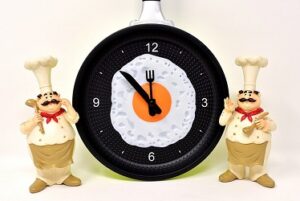 I’ve been saying for some time now that one key to healthy eating patterns is the following:
I’ve been saying for some time now that one key to healthy eating patterns is the following:
Don’t eat in the evening.
Sounds pretty simple, but there are actually quite a few moving parts involved in this brief statement, most of them running counter to the way we eat in our modern American culture. Here’s the way it can go for a hypothetical Typical American Eater, or TAE:
1. Breakfast is a cup of coffee at most. “I don’t feel like eating in the morning” or “I don’t like breakfast” is a TAE mantra.
2. Mid-morning hits, and hunger finally kicks in. What to do? It’s not lunchtime yet, but there are donuts in the breakroom (brought by the Evil Donut Bringer) or candy bars or pastries in the vending machine. Maybe there’s a bag of chips lurking somewhere. (Note that this TAE day is predicated on some sort of office or retail job; someone who has a physically-demanding job and is out and about during the morning is probably going to be sensible enough to fuel up before going off to work.)
3. Lunchtime! Maybe the mid-morning snack has been recent enough that our TAE isn’t very hungry, so this meal gets shorted.
4. Mid-afternoon hits, and so does hunger. Lunch was probably skimpy, after all. So another snack is consumed.
5. Dinnertime! Almost no one says, “I’m not very hungry; I’ll just have a salad for dinner” or, even more rare, “I’ll just skip dinner.” For most people dinner is their largest meal, especially if it’s eaten out. Family dinner at home, though, is usually served . . . family style, which means that taking seconds or thirds is all too easy. After all, the pot or casserole or serving dish is sitting there right on the table, with plenty more to be had.
6. Evening munching then begins. Perhaps there’s TV watching or computer scanning with accompanying sn-a-a-a-a-cks. Perhaps there’s a trip to the movie theater with accompanying popcorn and pop. And then there may be the ritual of the pre-bedtime bowl of ice cream. Our TAE goes to bed with undigested food still hanging around in his/her stomach. (A pretty yucky image, I know.) And that late-evening eating leads to . . .
7. Breakfast is a cup of coffee at most. “I’m not hungry in the morning.” And the whole unhealthy cycle begins anew. Confirmed breakfast-eater that I am, if by chance I’ve eaten something later in the evening than I usually do then food in the morning can seem pretty unappealing even to me. So it’s not really that you don’t like breakfast, or you’re not hungry in the morning as some kind of permanent condition. It’s that you still have food sitting in your stomach from the night before. Remember, once you go to sleep all of your bodily processes slow way down, including digestion. You should try never to go to bed on a full stomach. Feeling a little hungry at bedtime is fine. You can think about that great breakfast you’re going to have. (And you don’t have to eat breakfast food at breakfast. If you don’t like pancakes or cereal or eggs, there’s no law that says you can’t eat leftover pizza for breakfast, or a sandwich. Be a little creative here!)
This TAE pattern of eating is exactly the opposite of what it should be in terms of when the calories are consumed. We’re all so tired of hearing “breakfast is the most important meal of the day,” but it’s nevertheless true–that’s why you keep hearing it! You skip breakfast and you set yourself up for the unhealthy pattern of pushing food consumption to the end of the day. And now there’s some scientific evidence to back up the common-sense idea that you should eat the most when you’re going to be doing the most and stop eating when you aren’t doing much. This article in the Washington Post spells out the latest research in this regard:
“Timing Your Meals May Help with Weight Loss. That’s What It Seems to Do in Mice.”
Well, I haven’t even gotten to the larger picture here, and I do want you to read the article linked to above, so I’m going to continue with these ideas in my next post. In case you’re wondering, by the way, I do indeed sometimes struggle with the urge to snack in the evenings, especially if I’ve been pretty restrained at dinner, as I should be. I need to be more consistent about making one small change in my evening schedule that helps tremendously in this regard: to brush and floss immediately after dinner. When I’ve done this it’s been amazing how I totally lose interest in eating anything more before I go to bed.
More to come on this fascinating topic!